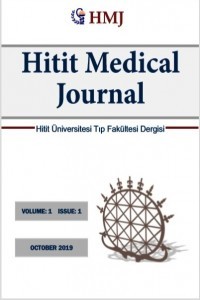Toplum Kaynaklı Üriner Enfeksiyon Etkeni Escherichia coli Suşlarında Antibiyotik Direnci
Amaç: Antibiyotik direnci önemli bir sağlık problemidir ve sağlık sistemi üzerine yaptığı olumsuz etkiler gün geçtikçe artmaktadır. Bu çalışmada; toplum kaynaklı üriner sistem enfeksiyonu etkeni Escherichia coli suşlarının antibiyotiklere duyarlılık oranları incelendi. Gereç ve Yöntem: Temmuz 2019 ile Haziran 2020 arasında; toplum kaynaklı üriner sistem enfeksiyonu etkeni olarak Escherichia coli üremesi saptanan 494 hastanın antibiyogram sonuçları ve demografik özellikleri retrospektif olarak değerlendirildi. Bulgular: Antibiyotiklerin Escherichia coli'ye gösterdikleri direnç oranları, en az ve en çok olanları sırasıyla; amikasin (%0,4), tigesiklin (%2), imipenem (%2), meropenem (%2), sefiksim (%32), seftriakson (%29) ve trimetoprim-sülfametaksazol (%28) olarak saptandı. Sonuç: Toplumdan edinilmiş üriner sistem enfeksiyonunda ampirik olarak; oral fosfomisin veya nitrofurantoin ya da günde tek doz intramusküler amikasin kullanılmasının akılcı olacağı, öte yandan; sefiksim, trimetoprim-sülfametaksazol, siprofloksasin ve sefuroksim kullanılırken, yüksek antibiyotik direnci nedeniyle dikkatli olunması gerektiği düşünülmektedir.
Anahtar Kelimeler:
Escherichia coli, , Antibiyotik Direnci, Üriner Enfeksiyon
Antimicrobial Resistance of Escherichia coli Strains in Community Acquired Urinary Tract Infections
Introduction: Antibiotic resistance is one of the most important health issues and its negative effect on global health is increasing everyday. In this reported study, antibiotic sensitivity of Escherichia coli strains that cause community acquired urinary tract infections were inspected. Method: Between July 2019 and June 2020, 494 patients in which Escherichia coli was isolated in cultures as community acquired urinary tract infection etiology were inspected. Antibiogram and demographic data of patients were evaluated retrospectively. Results: Resistance of Escherichia coli for antibiotics from least to most frequent were found to be; amikacin (0.4%), imipenem (2%), meropenem (2%), fosfomycine (4%), nitrofurantoin (4%), ceftazidim (9%), amoxicillin/clavulonic acid (13%), ciprofloxacin (22%), trimethoprim-sulfamethoxazole (%28), ceftriaxsone (29%) and cefixime (32%). Conclusion: In community acquired urinary tract infections, ampiric fosfomycine or nitrofurantoin oral intake or intramuscular amikacin administration will be wisely. On the other hand cefixime, trimethoprim-sulfamethoxazole, ciprofloxacin and cefuroksim usage must be reevaluated because of more frequent antibiotic resistance.
Keywords:
Escherichia coli, , Antibiotic Resistance, Urinary Tract Infection,
___
- Stamm WE, Norrby RS. Urinary tract infections: disease panorama and challenges. J Infect Dis. 2001;183(Suppl 1): S1–4.
- Auer S, Wojna A, Hell M. Oral treatment optionsfor ambulatory patients with urinary tract infections caused by extended-spectrum-ß-lactamase producing Escherichia coli. Antimicrob Agent Chemother. 2010;54(9):4006-8.
- Coşkun Ö, Erdem H, Avcı A. Management of community- acquired acute bacterial cystitis in Turkey. Turk J Med Sci. 2011;41(1):149-57.
- O’Neill J. Tackling Drug-Resistant Infections Globally: Final Report and Recommendations. http://amr-review.org/sites/default/files/160525_Final %20paper_with%20cover.pdf.
- UK Department of Health. UK Secures Historic UN Declaration on Antimicrobial Resistance. https://www.gov.uk/government/news/uk-secureshistoric-un-declaration-on-antimicrobial-resistance.
- Chin TL, MacGowan AP, Bowker KE, Elder F, Beck CR, McNulty C. Prevalence of antibiotic resistance in Escherichia coli isolated from urine samples routinely referred by general practitioners in a large urban centre in South-west England. J Antimicrob Chemother. 2015;70:2167–9.
- Hooton TM, Besser R, Foxman B, Fritsche TR, Nicolle LE. Acute uncomplicated cystitis in an era of increasing antibiotic resistance: A proposed approach to empirical therapy. Clin Infect Dis. 2004;39(1):75-80.
- Köken G, Aşık G, Çiftçi İH, Çetinkaya Z, Aktepe OC, Yılmazer M. Toplum kökenli üriner sistem infeksiyonu etkeni Escherichia coli suşlerında fosfomisin trometamol etkinliği. ANKEM Derg. 2008;22(1):23-27.
- Gupta K, Hooton TM, Naber KG et al. International clinical practice guidelines for the treatment of acute uncomplicated cystitis and pyelonephritis in women: a 2010 update by the Infectious Diseases Society of America and the European Society for Microbiology and Infectious Diseases. Clin Infect Dis. 2011;52:e103–e120.
- Mazzulli T. Antimicrobial resistance trends in common urinary pathogens. Can J Urol. 2001;8(Suppl 1):2-5.
- Hooper DC. Urinary tract agents: nitrofurantoin and methenamine. In: Mandell GL, Bennett JE, Dolin R, eds. Mandell, Douglas, and Bennett’s principles and practice of infectious diseases. 5th ed. Vol 1. Philadelphia: Churchill Livingston, 2000:423–8.
- Neu HC. Fosfomycin Trometamol versus Amoxycillin – single-dose multicenter study of urinary tract infections. Chemotherapy. 1990;36 Suppl 1:19-23.
- Arslan H, Azap OK, Ergönül O, Timurkaynak F. Risk factors for ciprofloxacin resistance among Escherichia coli strains isolated from community-acquired urinary tract infections in Turkey. J Antimicrob Chemother. 2005;56:914-8.
- Reis AC, Santos SR, Souza SC, Saldanha SC, Pitanga TN, Oliveira RR. Ciprofloxacin resistance pattern among bacteria isolated from patients with community-acquired urinary tract infection. Rev Inst Med Trop Sao Paulo. 2016;58:53.
- Stapleton PJ, Lundon DJ, McWade R, ve ark. Antibiotic resistance patterns of Escherichia coli urinary isolates and comparison with antibiotic consumption data over 10 years, 2005-2014. Ir J Med Sci. 2017;186(3):733-41.
- Şahin İ, Şencan İ, Kaya D, Gülcan A, Öksüz Ş. Hastane infeksiyonu etkeni üropatojen Escherichia coli izolatlarının çeşitli antibiyotiklere direnç durumu. ANKEM Derg. 2004;18(4):193-5.
- Shams S, Hashemi A, Esmkhani M, Kermani S, Shams E, Piccirillo A. Imipenem resistance in clinical Escherichia coli from Qom, Iran. BMC Res Notes. 2018;11:314.
- Mehr SS, Powell CVE, Curtis N. Cephalosporin resistant urinary tract infections in young children. J Paediatr Child Health. 2004;40(1-2):48-52.
- Aykan SB, Ciftci IH. [Antibiotic resistance patterns of Escherichia coli strains isolated from urine cultures in Turkey: a meta-analysis]. Mikrobiyol Bul. 2013 Oct;47(4):603-18. doi: 10.5578/mb.6383
- Yayın Aralığı: Yılda 3 Sayı
- Başlangıç: 2019
- Yayıncı: Hitit Üniversitesi
Sayıdaki Diğer Makaleler
Uterusun Kavernöz Hemanjiomatöz Polipi
Gökhan VARLI, Ahmet KILIÇARSLAN
Sağlık Okuryazarlığı Perspektifinden Yeni Koronavirus Enfeksiyonu: Olgu Sunumu
Serdar ÖZDEMİR, Hatice AKÇA, İbrahim ALTUNOK, Abdullah ALGIN, Kamil KOKULU
Toplum Kaynaklı Üriner Enfeksiyon Etkeni Escherichia coli Suşlarında Antibiyotik Direnci
Recep ALANLI, Bülent Ahmet BEŞİRBELLİOĞLU, Gültekin ÇELİK
Tuğba CEBECİ, Neslihan GÜNDOĞAN
Nadir Benign Deri Eki Tümörü: Kutanöz Lenfadenoma
Tuğba CEBECİ, Neslihan GÜNDOĞAN
Yeni Yapılanan Bir Üniversite Hastanesinde Diyabetik Ayak Kliniği Deneyimi
